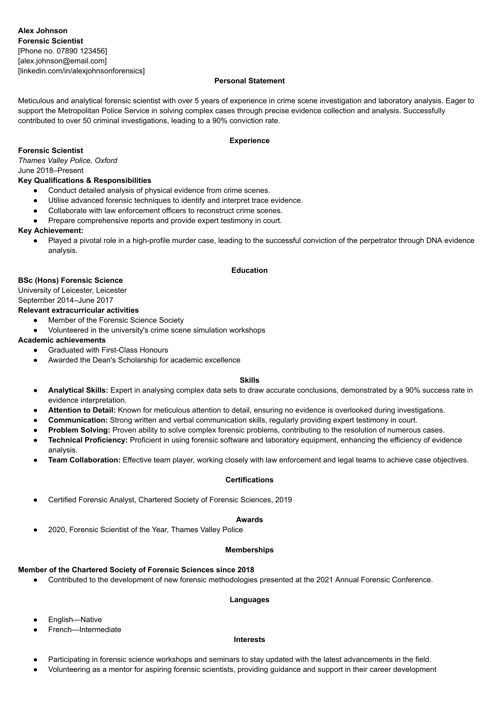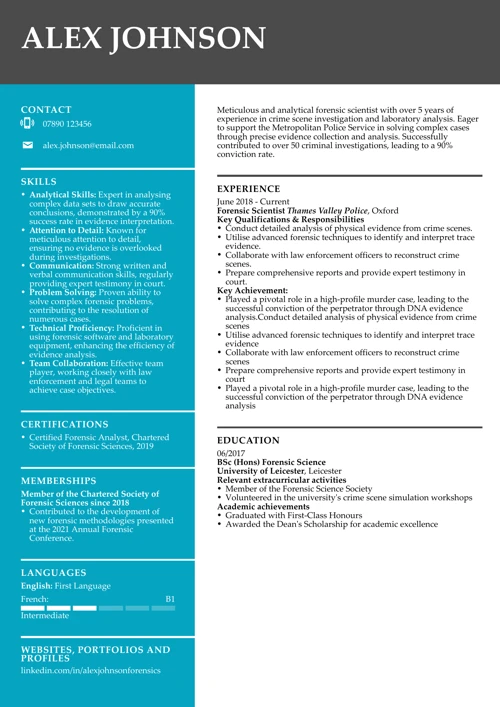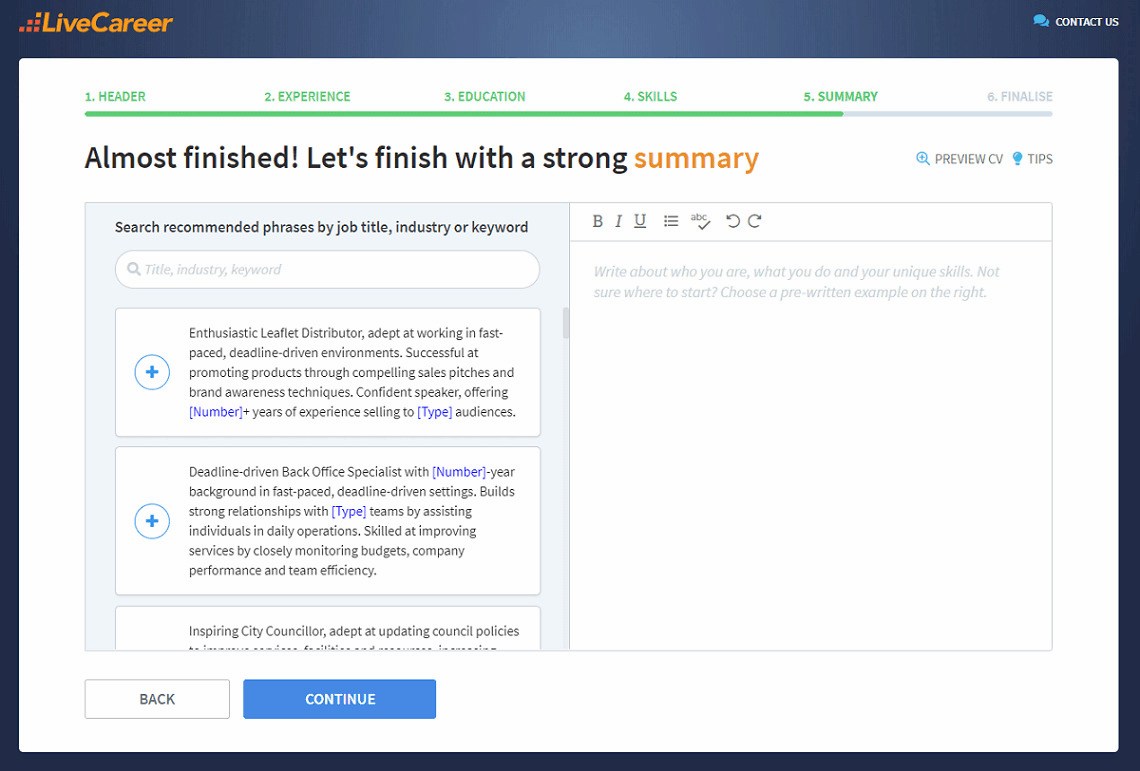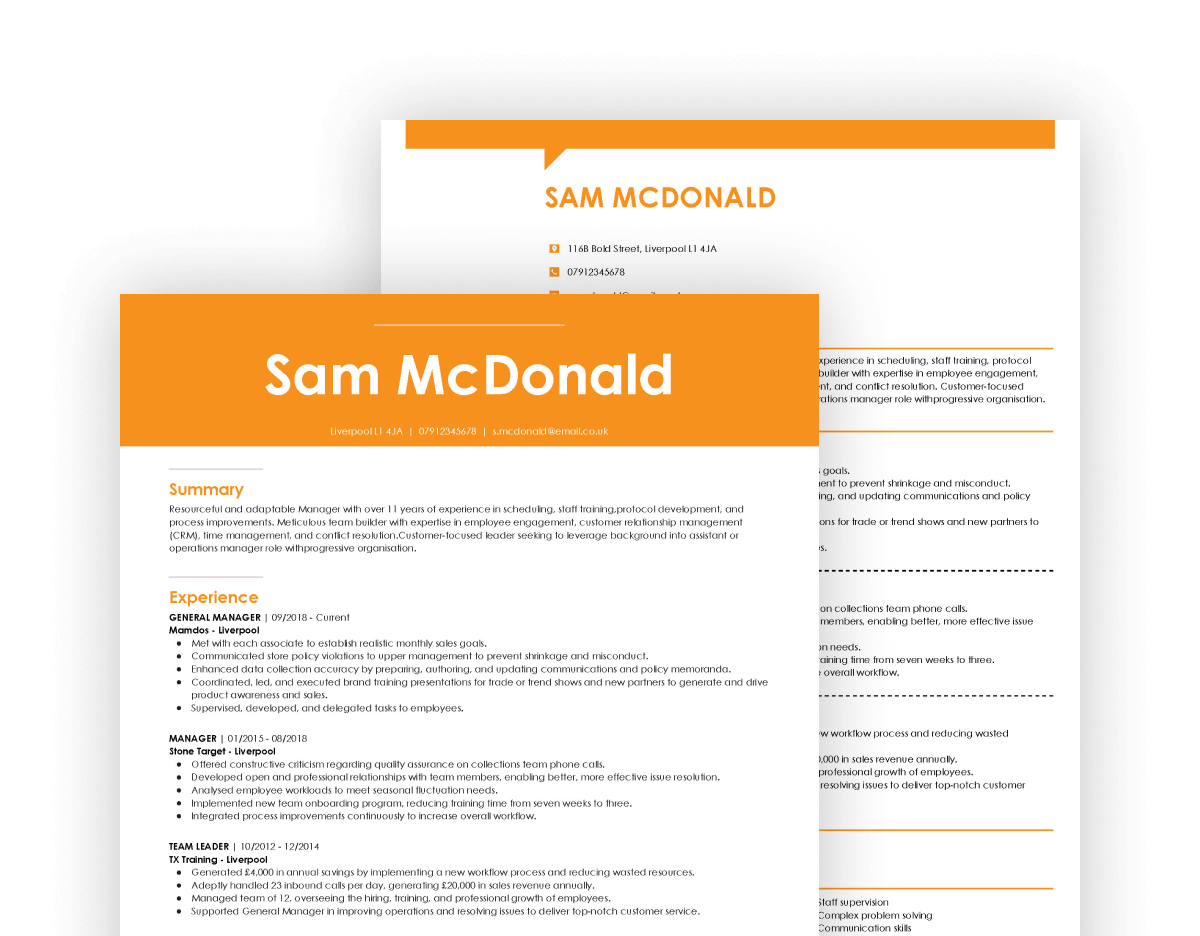Create a professional CV now!
 NO
NO YES
YESOur customers were hired by:
Forensic scientists play a crucial role in the justice system, utilising scientific expertise to analyse evidence and solve crimes. Crafting an effective forensic scientist CV is essential to demonstrate your analytical skills, attention to detail, and ability to work under pressure. This article provides expert CV-writing tips and tailored examples to help you stand out in this competitive field and secure your next role.
Create an effective CV in minutes. Choose a professional CV template and fill in every section of your CV in a flash using ready-made content and expert tips.
Create a professional CV now!
 NO
NO YES
YESWe created the sample on the right using our builder. See other good CV examples like this one.
Save a lot of time—just copy this example and use our tips to adjust it to your needs:
Alex Johnson
Forensic Scientist
[Phone no. 07890 123456]
[alex.johnson@email.com]
[linkedin.com/in/alexjohnsonforensics]
Personal Statement
Meticulous and analytical forensic scientist with over 5 years of experience in crime scene investigation and laboratory analysis. Eager to support the Metropolitan Police Service in solving complex cases through precise evidence collection and analysis. Successfully contributed to over 50 criminal investigations, leading to a 90% conviction rate.
Experience
Forensic Scientist
Thames Valley Police, Oxford
June 2018–Present
Key Qualifications & Responsibilities
Key Achievement:
Education
BSc (Hons) Forensic Science
University of Leicester, Leicester
September 2014–June 2017
Relevant extracurricular activities
Academic achievements
Skills
Certifications
Awards
Memberships
Member of the Chartered Society of Forensic Sciences since 2018
Languages
Interests
This forensic scientist CV sample skillfully underscores analytical capabilities. From the outset in the personal statement, the CV is tailored to indicate how the candidate can contribute to the organisation's success. Notably, it highlights a significant achievement for a forensic scientist, even before delving into the employment history. Adopting this approach ensures your forensic scientist CV can boost your visibility in the recruitment process.
Crafting a compelling forensic scientist CV involves more than listing your qualifications. Here are five targeted strategies to create a CV that resonates with employers in this field:
These tips are designed to help you write an effective forensic scientist CV. However, you may need to refresh your knowledge of CV-writing fundamentals if you haven’t written one for a while.
Here’s a quick writing guide to help you prepare a forensic scientist CV that’s tailored to the job:
With a competitive job market, you’re likely aiming to apply for several positions. It’s beneficial to have a versatile CV that can be quickly customised to suit different job applications.
The tips below will help you tailor your forensic scientist CV to each role, allowing you to adapt your application as needed:
The structure of your CV is as crucial as order in your laboratory. Avoid haphazard placement of information. Begin with a header, followed by a personal statement, work history, education, skills, and any additional sections. Arrange your work history in reverse chronological order, and adjust the order of education and work experience if you lack direct experience.
Career experts recommend using simple CV templates, which are favoured by recruiters and applicant tracking systems. Your forensic scientist CV should be clear and professionally formatted. Set margins to one inch on all sides and use 1–1.15 line spacing to ensure ample white space. Choose professional fonts like Times New Roman or Calibri, with font sizes of 11–12 for the body and 13–14 for headings. Once your CV is polished, save it as a PDF unless another format is specified by the application system.
Your personal statement acts as a spotlight for your credentials. Impress employers with an impactful personal introduction by demonstrating your professional accomplishments and tailoring your statement to the forensic role you want. This ensures you stand out among numerous candidates. Aim for a concise introduction of three to four sentences.
A strong CV summary will convince the recruiter you’re the perfect candidate. Save time and choose a ready-made personal statement written by career experts and adjust it to your needs in the LiveCareer CV builder.

When employers review your forensic scientist CV, they are keen to see evidence of your capability to perform the relevant duties efficiently. The work experience section of your CV should reflect your ability to analyse evidence, utilise laboratory equipment, and prepare detailed reports. Compose 3–5 bullet points emphasising your effectiveness in forensic tasks, and include one noteworthy achievement that highlights your expertise. Initiate each point with an action verb for a CV to enhance its impact.
Even if you lack direct forensic roles in your history, it doesn't mean you lack relevant experience. Various jobs, volunteer work, or academic projects may involve similar responsibilities. Consider creating a skills-based CV to prioritise your applicable skills at the forefront of your application.
We’ve prepared a list of exemplary professional achievements for a forensic scientist CV to inspire you:
Professional duties & achievements for a forensic scientist CV—examples
While GCSEs in subjects like English and maths can provide a foundation for some roles, a degree in forensic science or a related field greatly enhances your prospects in this field. Start with your highest qualification and list them in reverse order to emphasise your educational background. If you’re a recent graduate, include relevant coursework and extracurricular activities that demonstrate your competencies in forensic science.
Much like organising a meticulous forensic report, there's an art to listing skills on your CV. Avoid the mistake of randomly listing competencies without context or relevance. Instead, align your forensic skills with the job posting and describe how they enhance your professional capabilities.
A forensic scientist's skill set should include a blend of soft skills and technical skills. Analytical skills, communication skills, attention to detail, proficiency with forensic software, and critical thinking are just a few examples. Carefully review the job description to ensure you include all the necessary skills sought by employers for the role you’re targeting.
Consider including additional CV sections thoughtfully. They offer a chance to present more of your qualifications and interests that align with the job.
Your options extend beyond just professional certifications or licences. For example, being multilingual could be particularly advantageous in environments that deal with international cases. Furthermore, hobbies and interests can also underscore your dedication to forensic science, adding depth to your forensic analyst CV.
An effective job application isn’t complete without a cover letter that expands on the information from the CV.Make your cover letter personal by demonstrating genuine interest in the position. Follow the introduction with an overview of your forensic science qualifications and key strengths, and conclude the letter by explaining how they’ll benefit from hiring you. Propose a meeting or a phone call to discuss the details, and sign off professionally.
You don’t have to be a CV writing expert. In the LiveCareer CV builder you’ll find ready-made content for every industry and position, which you can then add with a single click.

Applying for other jobs? Try these CV examples as well:
Standing out in the forensic science field demands precision, dedication, and a well-crafted CV. Elevate your career prospects by investing time in tailoring your forensic science CV to highlight your unique skills and experiences.
Thank you for taking the time to explore our forensic scientist CV guide. We hope you found it insightful and helpful. Feel free to leave any questions or comments below, and we'll be happy to assist you further in your forensic science career journey.
Our editorial team has reviewed this article for compliance with Livecareer’s editorial guidelines. It’s to ensure that our expert advice and recommendations are consistent across all our career guides and align with current CV and cover letter writing standards and trends. We’re trusted by over 10 million job seekers, supporting them on their way to finding their dream job. Each article is preceded by research and scrutiny to ensure our content responds to current market trends and demand.
About the author
Since 2013, the LiveCareer UK team has shared the best advice to help you advance your career. Experts from our UK editorial team have written more than one hundred guides on how to write the perfect CV or cover letter.
Rate this article:
Forensic scientist cv
Average:


Writing an academic CV requires a focus on showcasing your academic and professional accomplishments. Here's a step-by-step guide on how to create it to continue your research.

How to write a good pharmacist CV in the UK? Check out our pharmacist CV template, including pharmacy personal statement examples and expert tips.

Writing an engineering CV isn't as tough as designing engineering experiments. See engineering CV examples that will help you pursue new innovations.
Our customers were hired by: